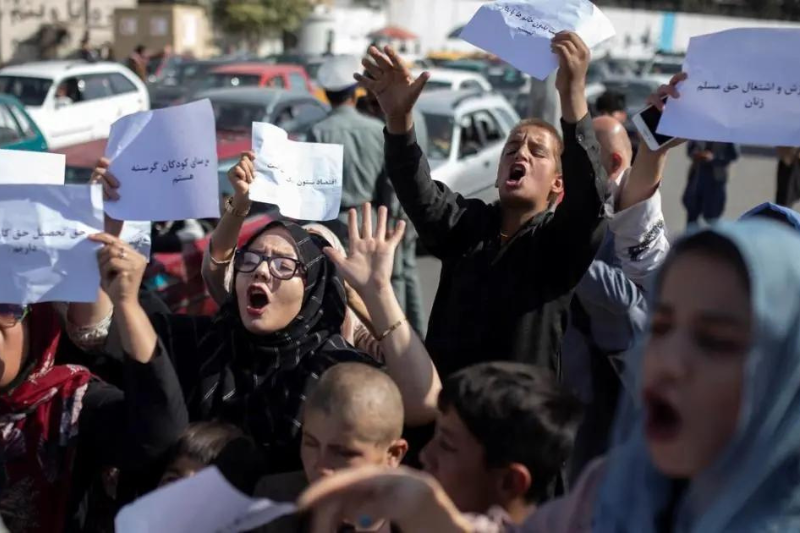

afghanistan un should prioritise rights
Human Rights Watch submitted today to the special coordinator leading a UN Security Council-mandated independent assessment of the international response to the Afghanistan crisis that it should prioritize human rights, especially women and girls’ rights. The special coordinator should ensure that the assessment includes survivors of human rights violations and makes recommendations to prevent and punish rights abuses.
In March 2023, the Security Council requested the UN to conduct and submit by November 17 an “integrated, independent assessment” with forward-looking recommendations for an integrated and coherent approach by relevant political, humanitarian, and development actors to the Afghanistan crisis. The resolution required stakeholder consultations, including Afghan women. The UN secretary-general appointed former senior Turkish government official Feridun Sinirlioğlu as special coordinator in April.
Human Rights Watch associate women’s rights director Heather Barr called Afghanistan’s situation the world’s worst. The independent assessment could improve the international response to this dire situation, but it must prioritize women and girls and other survivors of rights violations.
Afghan women and girls have lost most of their rights since the Taliban took power in August 2021. Taliban abuses include not letting girls and women go to school past the sixth grade, not letting women work in most jobs, making it hard for women and girls to travel or even leave their homes, banning women and girls from competitive sports, tearing down the system that had been set up to deal with gender-based violence and a brutal crackdown that includes torturing and mistreating women who have spoken out against these abuses.
Afghan women are barred from working for international NGOs and the UN. In a country where 28.8 million people need food, these bans have prevented many Afghan women and girls from receiving humanitarian aid.
Recent Taliban orders have removed women from kindergartens and closed all beauty salons, a significant source of women’s remaining employment and a rare place for women and girls to find community and support outside their homes.
Afghanistan’s women’s rights crisis is part of a larger human rights and humanitarian crisis with many other abuses and widespread hardship. Most Afghan humanitarian organizations—including those led by women and those targeting women and women-headed households—lack funding. The World Food Programme has stopped feeding eight million Afghans. The Afghan Trust Fund solved some banking issues, but humanitarian groups, local businesses, and individuals still cannot transfer money.
The Taliban annihilated Media. Journalists and critics, including education activist Matiullah Wesa, have been imprisoned without trial. Prisoners are tortured. The Taliban have persecuted LGBTQ people and forced them into hiding.
Islamic State of Khorasan Province still kills civilians. Their widespread Shia and Hazara attacks are crimes against humanity.
Barr said the humanitarian crisis in Afghanistan is overwhelming, and Taliban abuses are worsening it. “The independent assessment should urgently redirect the international community’s response to Afghanistan, which has been inconsistent, ineffective, and insufficiently focused on human rights.”
Human Rights Watch advised the special coordinator to include human rights experts, including women and girls’ rights, in every aspect of the assessment. The assessment process should be transparent and allow all stakeholders to submit.
The assessment team should interview survivors of human rights abuses and family members and friends of those arbitrarily detained, forcibly disappeared, or extrajudicially killed. They should actively consult with women’s rights activists, including those who have protested Taliban abuses. Girls, Hazara, Shia, LGBT Afghans, journalists, including women journalists, and local Afghan-led humanitarian groups should also be heard.
Barr said Afghan women, girls, and others under Taliban repression feel abandoned by the world. The independent assessment should restore global attention to Afghanistan and propose concrete tools for holding the Taliban and other rights violators accountable.
Following another performance-based dismissal wave Infosys fired 240 trainees for underperforming in their assessments. During February and again in this…
The county of Los Angeles is on track for a major strike of its workers wherein more than 55000 government…
With the aim of minimising the staff in the CFPB (Consumer Financial Protection Bureau) which are overseen by Elon Musk…
As Pakistan continues to send undocumented Afghan migrants back to Afghanistan, it’s the poor who are being hit the hardest.…
The latest reports show Tesla needs to reduce Cybertruck assembly volumes while relocating employees because its sales figures failed to…
Over 100 ground staff of London's Gatwick Airport who were employed by the Red Handling have decided to involve themselves…
This website uses cookies.
Read More